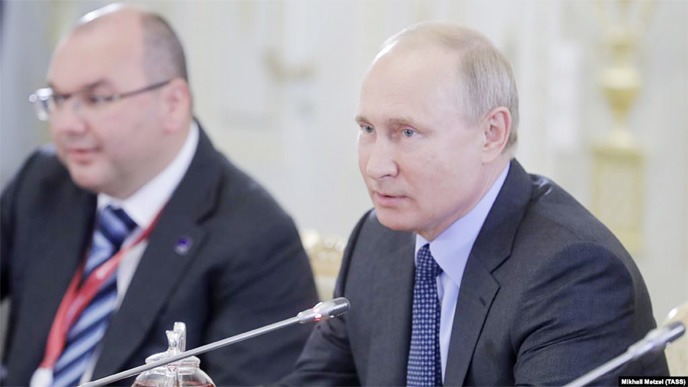
AP, Saint Petersburg :
In a far-ranging discussion on foreign policy, President Vladimir Putin said that Russia is prepared to drop the New START arms control treaty if the United States is not interested in renewing it.
Speaking on June 6 at the St. Petersburg International Economic Forum, Putin also denied Moscow is pulling defense personnel out of Venezuela, contradicting an earlier comment by U.S. President Donald Trump.
On Britain, Russia’s leader said it is time for the two countries to “turn the page” in their strained ties and to “leave behind” matters related to the poisoning of a former Russian spy in England last year.
Putin made the comments amid persistent tensions between Russia and the West over issues including the Ukrainian and Syrian conflicts, Moscow’s meddling in other countries’ elections, and the nerve agent attack on former Russian double agent Sergei Skripal and his daughter in the southern British city of Salisbury.
There is also uncertainty over the fate of two U.S.-Russia arms-control treaties, including New START, the only bilateral pact limiting deployed strategic nuclear weapons.
At a meeting with the heads of international news agencies in St. Petersburg, Putin said Washington is reluctant to begin talks on extending the deal, which is due to expire in 2021.
“We do not have to extend it. Our systems can guarantee Russia’s security for quite a long period of time,” Putin said.
“If no one feels like extending the New START agreement, well, we won’t do it then,” the Russian president said.
The pact, signed in Prague in 2010, provided for limiting to 1,550 the number of strategic nuclear warheads deployed by either country-down almost two-thirds from the 6,000-warheads limit in the original START I treaty which entered into force in 1994 and expired in 2009.
“Everything ends in 2021,” Putin said. “There will be no instruments left to curb the arms race.”
Moscow and Washington are also at odds over the bilateral 1987 Intermediate-Range Nuclear Forces (INF) Treaty, which eliminated an entire class of missiles.
In February, the United States suspended its participation in the agreement, with Washington and its allies accusing Russia of deploying a missile system that violates the pact.
Russia, which denies the accusation, later followed suit. Moscow accuses the United States of breaking the accord itself, an allegation rejected by Washington.
The INF Treaty banned the United States and Russia from developing, producing, and deploying ground-launched cruise or ballistic missiles with ranges of between 500 and 5,500 kilometers.
Putin said that his most recent phone conversation with Trump gave him some cause for “optimism” concerning issues related to arms control, but he insisted that practical steps are needed.
In a far-ranging discussion on foreign policy, President Vladimir Putin said that Russia is prepared to drop the New START arms control treaty if the United States is not interested in renewing it.
Speaking on June 6 at the St. Petersburg International Economic Forum, Putin also denied Moscow is pulling defense personnel out of Venezuela, contradicting an earlier comment by U.S. President Donald Trump.
On Britain, Russia’s leader said it is time for the two countries to “turn the page” in their strained ties and to “leave behind” matters related to the poisoning of a former Russian spy in England last year.
Putin made the comments amid persistent tensions between Russia and the West over issues including the Ukrainian and Syrian conflicts, Moscow’s meddling in other countries’ elections, and the nerve agent attack on former Russian double agent Sergei Skripal and his daughter in the southern British city of Salisbury.
There is also uncertainty over the fate of two U.S.-Russia arms-control treaties, including New START, the only bilateral pact limiting deployed strategic nuclear weapons.
At a meeting with the heads of international news agencies in St. Petersburg, Putin said Washington is reluctant to begin talks on extending the deal, which is due to expire in 2021.
“We do not have to extend it. Our systems can guarantee Russia’s security for quite a long period of time,” Putin said.
“If no one feels like extending the New START agreement, well, we won’t do it then,” the Russian president said.
The pact, signed in Prague in 2010, provided for limiting to 1,550 the number of strategic nuclear warheads deployed by either country-down almost two-thirds from the 6,000-warheads limit in the original START I treaty which entered into force in 1994 and expired in 2009.
“Everything ends in 2021,” Putin said. “There will be no instruments left to curb the arms race.”
Moscow and Washington are also at odds over the bilateral 1987 Intermediate-Range Nuclear Forces (INF) Treaty, which eliminated an entire class of missiles.
In February, the United States suspended its participation in the agreement, with Washington and its allies accusing Russia of deploying a missile system that violates the pact.
Russia, which denies the accusation, later followed suit. Moscow accuses the United States of breaking the accord itself, an allegation rejected by Washington.
The INF Treaty banned the United States and Russia from developing, producing, and deploying ground-launched cruise or ballistic missiles with ranges of between 500 and 5,500 kilometers.
Putin said that his most recent phone conversation with Trump gave him some cause for “optimism” concerning issues related to arms control, but he insisted that practical steps are needed.

